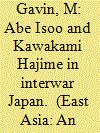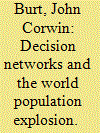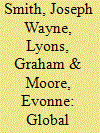|
|
|
Sort Order |
|
|
|
Items / Page
|
|
|
|
|
|
|
| Srl | Item |
| 1 |
ID:
102535


|
|
|
|
|
| Publication |
2011.
|
| Summary/Abstract |
This article explores the views of two eminent professors of economics, Abe Isoo (1865-1949) and Kawakami Hajime (1879-1946), regarding their socialist economic theories for easing poverty in Japan during the interwar years (1918-1939). Prior to this period, Abe believed the cure to capitalism's ills lay in a combination of socialist economic reforms (sangyô demokurashii) and individual spiritual refinement. Kawakami, at that time a bourgeois economist, prioritised the spiritual revolution of the rich over any socialist-type economic reform. Thus, although convinced of the need for a different approach to eradicating poverty, they nevertheless agreed in the need for gradual change rather than radical reform (Gavin East Asia An International Quarterly 24:1, 30). The year 1928 marked a significant turning point both for Japanese social movements and in the lives of Abe and Kawakami. That year heralded Japan's first national election under the new Universal Male Suffrage Law, and saw the police exercise their extended authority as they undertook a nationwide round-up of students and intellectuals suspected of left-wing tendencies (the March 15 Incident). Also in that year, Abe and Kawakami resigned from academic posts to dedicate themselves to alleviating the privations of the working class. Abe, by then well known as the father of Japanese socialism and as a Christian pacifist, became a symbolic figure for Japan's working class parties, although he later came to support the government during WWII. Kawakami, who was forced to resign from his post during the round-up, "washed his hands of bourgeois economics", became a prominent spokesman for Marxism in Japan ([28], xi, pp. 76, 169). This article will reveal that both Abe and Kawakami's social and economic theories changed during the interwar period, so that Abe came to see imperial sovereignty as crucial to socialist economic reform, while Kawakami came to see it as a minion of the capitalists and advocated institutional and political revolution.
|
|
|
|
|
|
|
|
|
|
|
|
|
|
|
|
| 2 |
ID:
029032


|
|
|
|
|
| Publication |
London, Sage Publications, 1972.
|
| Description |
48p.
|
| Series |
Sage professional papers in International studies series
|
| Standard Number |
0803901801
|
|
|
|
|
|
|
|
|
|
|
|
Copies: C:1/I:0,R:0,Q:0
Circulation
| Accession# | Call# | Current Location | Status | Policy | Location |
| 013568 | 304.6/BUR 013568 | Main | On Shelf | General | |
|
|
|
|
| 3 |
ID:
001343


|
|
|
|
|
| Publication |
Westport, Praeger, 1998.
|
| Description |
xx, 185p.
|
| Standard Number |
0275956008
|
|
|
|
|
|
|
|
|
|
|
|
Copies: C:1/I:0,R:0,Q:0
Circulation
| Accession# | Call# | Current Location | Status | Policy | Location |
| 040413 | 363.91/SMI 040413 | Main | On Shelf | General | |
|
|
|
|
|
|
|
|
|